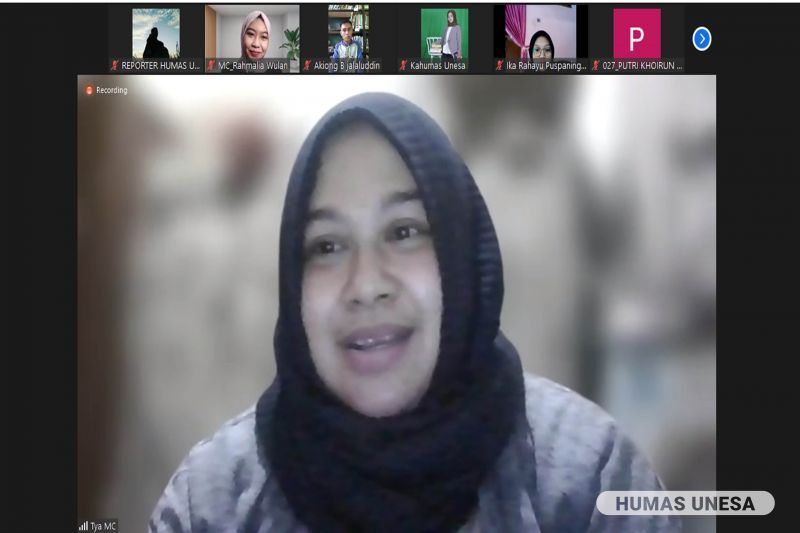
www.unesa.ac.id
Unesa.ac.id, SURABAYA-UPT HUMAS, State University of Surabaya (UNESA) held a Webinar for Branding Learning Series Volume 2 on Sunday (17/10/2021). The activity carries the theme “Time to Improve the Quality of Publication of Student Activities and Works; Time to Introduce UNESA to the World” and target student organizations (Ormawa) around UNESA, such as BEM, HMJ, UKM, Ormada, LSO, and others.
The event, which was held online, presented young speakers such as Tya Ezar who is an Announcer & Professional Master of Ceremony and Farah Manhillah as JJ FM announcer and UNESA Official Podcast Host. The activity was first opened by the Head of UNESA Public Relations Unit, Vinda Maya Setianingrum, S.Sos., M.A., who stated that learning about MC, broadcasting and reporters cannot only be read or seen by other people, but must also be practiced in real life.
Skills in this field are largely determined by flight hours or experience. Courage, desire to learn and keep trying are important assets for students to improve their skills in the world of MC, broadcaster and reporter. It can all be started from small things and opportunities such as in organizations, for example. Student organizations are a place for student activities, so they must be maximized as a place to learn and develop themselves. "Learn to be a moderator, event opener, or mc at organizational events," he said.
According to him, it is important to do. Learning and getting used to it really has to be from the smallest things to get used to and be able to fill large-scale activities. He emphasized that realizing dreams cannot be just wishful thinking. However, it must be realized and realized from small and simple things.
Still not confident and afraid of being wrong? "It's better to try and be wrong, than not to try at all. Wrong, mistaken and nervous is natural in the beginning. By trying that, we know where the mistakes are, which shortcomings need to be corrected in the future, "he explained. He emphasized that having the courage to start and try then evaluate and improve is the main provision to become a professional MC or broadcaster.
The Communication Science lecturer said that learning branding is also important. Branding is an effort to build a personal image in the eyes of others. The image in question includes character, competence and professionalism in the field that is occupied so that it becomes a special marker for others. Social media can be a means of self-branding. Students must fill out work-based social media content. With that people can recognize and know their abilities and skills.
Tya Ezar who delivered material on "How To Be A Good MC". According to him, being an MC does not only open and close activities, but also must be able to present a memorable atmosphere for the audience. Therefore, the MC must have a strategy so that the audience is interested, stays focused and follows the event until the end.
There are several tips that need to be considered to become an MC, namely, 1) learn to improvise, 2) be flexible and not rigid, 3) humble, 4) expressive, 5) creative, 6) imaginative, 7) communicative, 8) cooperative, 9 ) smart; able to read and understand situations, 10) have a sense of humor, 11) ice breaker, 12) have broad insight and intelligent comments, and 13) good attitude or manners.
Becoming an MC and public speaking must be dynamic and able to position oneself, not too rigid or too carried away. In addition, the MC does not just bring the event, but also brings the mandate and represents the event organizers. "An MC must be confident and open up," he said.
Meanwhile, Farah Manhillah stated, podcasts concentrate on sound although now there are also video podcasts. According to him, podcasts can be divided based on several things, such as the number of podcasters, podcast topics or podcast formats such as sound (mp3) or video (mp4).
This JJ FM announcer also explained that as a podcaster, listeners must be comfortable and not bored. One of the tricks is to be good at adjusting the intonation and style of language as if talking directly to the listener. For example, using the word "you" rather than the word "you", so that listeners feel like they are being invited to communicate.
In addition, he also added that podcasters must be able to adapt. He explained that there are differences between broadcasters and podcasters, such as if the broadcaster can be appointed to a role or the company has provided a plan of what to bring in the broadcast, while podcasters are more free to want to present topics as they wish. (Adi/zam).
Share It On:






